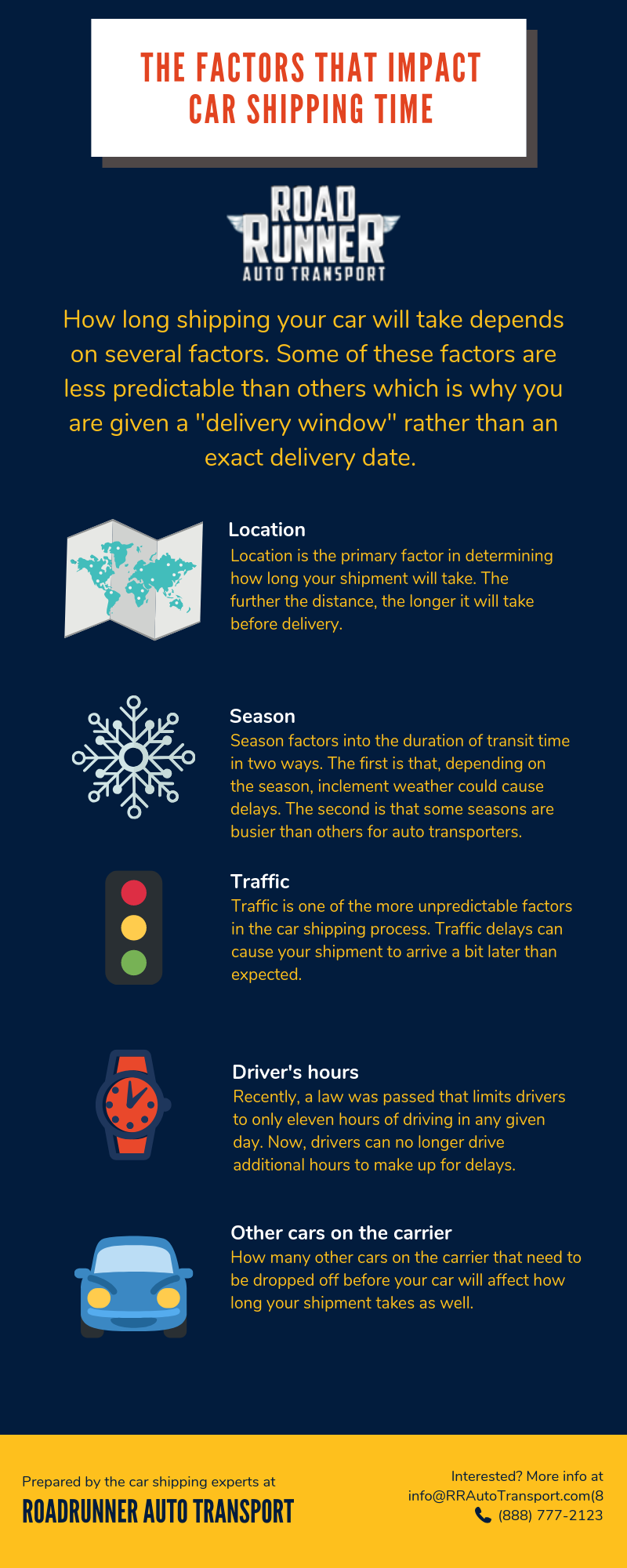
The trusted name in vehicle shipping for over 30 years!
- Track a Shipment
- Dealer Login
- Carrier Login
Speak with a shipping expert
(888) 777-2123

Car Shipment Time
Posted on 06/06/2018
Location
Season
Traffic
Drivers hours
How many other cars are on the carrier

There are many factors that impact your car shipment time. It is important to be proactive and realistic when making the decision to ship your car. If you are looking to book an open carrier transport, you are looking at a quicker car shipment time than if you were looking to book an enclosed carrier transport. Why? Enclosed carrier transports are not as in demand, which means they could take longer to find a carrier truck.
The time frame that includes dropping your car off for shipment and picking your car up at your new location is dependent on numerous factors.
Location
The first factor that impacts your car shipment time is location. Where are you shipping to? If your route is a commonly traveled route and includes major cities, then it is will take a shorter time to receive your car. However, if you are shipping to small town or a remote location, it will more than likely take a longer time to receive your car.
Season
Next up is what season you are considering to ship in. Season is important for two reasons. The first reason being if you are shipping to a location that is known for blizzards and snowfall, this may slow down your car shipment time. Weather plays a huge role on the roads, speeds, and driving conditions; therefore, winter months may impede your car shipment time. Secondly, some months are more in demand than others.
For example, the spring is a very busy month for car shipment companies due to snowbirds and vacationers. This can work in your favor or against you. High demand seasons means more carrier trucks on the road, so if you are proactive in booking your car shipment, you may have no problem. However, if you aren’t proactive in booking your car shipment, you may have trouble finding a company that isn’t completely booked up. Therefore, as soon as you know, call us so we can get the process started.
Traffic
This factor often goes hand-in-hand with season and weather, but traffic is one of the more unpredictable factors because of things like accidents and police activity. However, traffic is now more predictable than it used to be with intuitive driving apps such as Waze. With these apps a driver can be alerted to upcoming traffic and get an alternate route to avoid getting stuck.
The problem is that even with alternate routes, sometimes traffic delays are unavoidable. Holiday weekends like Memorial day is one such example. So, this is unfortunately something that cannot be factored into your original transit time estimation.
Yes, a general traffic estimation is factored in but a specific calculation of traffic during your shipment’s transit is impossible to calculate based on the specific unpredictability of traffic conditions.
Drivers Hours
Another factor in how long your car shipment might take is the hours a driver can legally work. Unfortunately, it is now against the law for drivers to drive for more than eleven hours in a day. This came into effect when the Electronic Logging Devices mandate came into affect about two years ago.
Previously, drivers could drive longer than that and often did, routinely driving sixteen hours a day. This is enforced through electronic devices installed on each truck that monitor and report the amount of driving a driver does each day.
Now, if a driver is behind his or her schedule, they cannot make it up by driving longer each day. So, you can unfortunately expect car shipments to take a little bit longer on average because of this limitation on the hours that a driver can drive.
How many other cars are on the carrier
How many other cars that a auto transport driver needs to deliver also makes a difference in the duration of your car shipment. If your car is on a carrier with eight or nine other cars that need to be delivered before your car is, it will take longer than if your car is on a carrier with only four other cars.
Conclusion
There are many factors at play when determining the duration of your transit time for your car shipment. This is why you receive a delivery window rather than an exact and guaranteed date, because it is not possible to predict the length of the shipment with a hundred percent accuracy.
You should be proactive and plan accordingly. Be ready for the off-chance that your shipment might come a day after when you initially expected. This way, if this does happen it will not have a large impact on your daily life.
Instant Car Shipping Quote
Calculate your car shipping rate in 3 easy steps!
Car Shipment Time
Posted on 06/06/2018
Location
Season
Traffic
Drivers hours
How many other cars are on the carrier

There are many factors that impact your car shipment time. It is important to be proactive and realistic when making the decision to ship your car. If you are looking to book an open carrier transport, you are looking at a quicker car shipment time than if you were looking to book an enclosed carrier transport. Why? Enclosed carrier transports are not as in demand, which means they could take longer to find a carrier truck.
The time frame that includes dropping your car off for shipment and picking your car up at your new location is dependent on numerous factors.
Location
The first factor that impacts your car shipment time is location. Where are you shipping to? If your route is a commonly traveled route and includes major cities, then it is will take a shorter time to receive your car. However, if you are shipping to small town or a remote location, it will more than likely take a longer time to receive your car.
Season
Next up is what season you are considering to ship in. Season is important for two reasons. The first reason being if you are shipping to a location that is known for blizzards and snowfall, this may slow down your car shipment time. Weather plays a huge role on the roads, speeds, and driving conditions; therefore, winter months may impede your car shipment time. Secondly, some months are more in demand than others.
For example, the spring is a very busy month for car shipment companies due to snowbirds and vacationers. This can work in your favor or against you. High demand seasons means more carrier trucks on the road, so if you are proactive in booking your car shipment, you may have no problem. However, if you aren’t proactive in booking your car shipment, you may have trouble finding a company that isn’t completely booked up. Therefore, as soon as you know, call us so we can get the process started.
Traffic
This factor often goes hand-in-hand with season and weather, but traffic is one of the more unpredictable factors because of things like accidents and police activity. However, traffic is now more predictable than it used to be with intuitive driving apps such as Waze. With these apps a driver can be alerted to upcoming traffic and get an alternate route to avoid getting stuck.
The problem is that even with alternate routes, sometimes traffic delays are unavoidable. Holiday weekends like Memorial day is one such example. So, this is unfortunately something that cannot be factored into your original transit time estimation.
Yes, a general traffic estimation is factored in but a specific calculation of traffic during your shipment’s transit is impossible to calculate based on the specific unpredictability of traffic conditions.
Drivers Hours
Another factor in how long your car shipment might take is the hours a driver can legally work. Unfortunately, it is now against the law for drivers to drive for more than eleven hours in a day. This came into effect when the Electronic Logging Devices mandate came into affect about two years ago.
Previously, drivers could drive longer than that and often did, routinely driving sixteen hours a day. This is enforced through electronic devices installed on each truck that monitor and report the amount of driving a driver does each day.
Now, if a driver is behind his or her schedule, they cannot make it up by driving longer each day. So, you can unfortunately expect car shipments to take a little bit longer on average because of this limitation on the hours that a driver can drive.
How many other cars are on the carrier
How many other cars that a auto transport driver needs to deliver also makes a difference in the duration of your car shipment. If your car is on a carrier with eight or nine other cars that need to be delivered before your car is, it will take longer than if your car is on a carrier with only four other cars.
Conclusion
There are many factors at play when determining the duration of your transit time for your car shipment. This is why you receive a delivery window rather than an exact and guaranteed date, because it is not possible to predict the length of the shipment with a hundred percent accuracy.
You should be proactive and plan accordingly. Be ready for the off-chance that your shipment might come a day after when you initially expected. This way, if this does happen it will not have a large impact on your daily life.
"Save time looking and just call Roadrunner Auto Transport - they truly helped make my move easier!"
Trish A.
Miami, FL


"When I bought a car out of state I was unsure what to expect with the shipping. RoadRunner made everything so easy!"
Jenna D.
Lufkin, TX


"Everything with RoadRunner went smooth and seamless. They gave me a great rate and provided excellent service!"
Owen A.
Hartford, CT


"My car arrived in mint condition. The service was great and the personnel very courteous. Great job guys!"
Victor B.
Fresno, CA


Frequently Asked Questions
Get answers to some of the most commonly asked questions about the vehicle transportation process.








